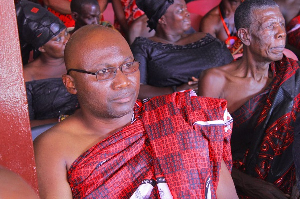- Home - News
- TWI News | TV
- Polls
- Year In Review
- News Archive
- Crime & Punishment
- Politics
- Regional
- Editorial
- Health
- Ghanaians Abroad
- Tabloid
- Africa
- Religion
- Election 2020
- Coronavirus
- News Videos | TV
- Photo Archives
- News Headlines
- Press Release
General News of Saturday, 2 January 2010
Source: Punch
Terror suspect: Nigeria, Ghana, SSS, NIA trade blame
The blame game that has characterized United States’ investigations into the alleged attempt by a Nigerian to explode a bomb on a US-bound passenger plane has moved to Africa.
In the wake of the event, American security agencies have been trading blame, with each agency claiming that the other could have thwarted the attack if it had acted sooner.
On Friday, on the continent, Ghana and Nigeria also got locked in an argument over where the suspect began his journey to Amsterdam. As this evolved, a report monitored on British Broadcasting Corporation on Friday also said that the State Security Service and the National Intelligence Agency were also trading blame on the incident.
Since the attempt was foiled, it had been widely assumed that the alleged bomber, 23-year-old Umar Farouk Abdulmutallab, began his journey in Nigeria. But speaking during the week, the Minister of Information, Mrs Dora Akunyili, said that Abdulmutallab began his journey in Accra, Ghana and only spent 30 minutes at the Murtala Mohammed International Airport before he boarded a plane to Amsterdam.
Akunyili, who also defended Nigeria’s security procedures, had said that the suspect’s passport was scanned on entry into Nigeria at 2008 (1908GMT), and again, as he boarded the flight to Amsterdam, at 2035.
“He was able to connect that fast because he was not checking in any luggage,” she said.
Other Nigerian officials had said earlier that the suspect’s round-trip ticket was bought in Accra for $2,831 in cash on Dec. 16.
But a senior Ghanaian government official told the BBC that Abdulmutallab spent no fewer than three hours at the MMIA, accusing Nigeria of trying to “pass the buck” in order to cover up its security lapses.
The senior Ghanaian government official said the suspect bought a one-way ticket to Lagos from Accra that would have given him more than three hours at the airport.
Another BBC report monitored in Lagos on Friday, “Nigeria‘s ‘blame game‘ over bomber”, detailed visits paid to the Department of State Security (popularly known as SSS here) headquarters in Abuja and the NIA by the foreing medium. According to the repot, “Nigeria‘s two main intelligence agencies has blamed the other for failing to share key information two months ago about Umar Farouk Abdulmutallab, the young man who allegedly went on to try to blow up a plane over the United States with nearly 300 people on board.
“Inside the offices two senior DSS officials told the BBC that Nigeria‘s other main security outfit, the Nigerian Intelligence Agency (NIA) had not shared key information given to it by the father of the suspect - information which could potentially have stopped Mr Abdulmutallab boarding the plane.
“The two senior DSS officials - who gave me their names and allowed me to take notes throughout a 20-minute interview - said the agency that Mr Abdulmutallab Sr had briefed had been the NIA.
“The DSS officials went on to claim that although their agency was responsible for maintaining airport ”watch-lists” of people under suspicion, the NIA had not shared the father‘s information with them. The DSS officials explained that their agency dealt with Nigeria‘s internal security while the NIA was responsible for external threats.”
The BBC reporter claimed he spoke to the Foreign Affairs Minister, Ojo Maduekwe, about the blame game but that he, (Maduekwe) replied that he would reserve judgement on the truth of the matter pending government enquiries ordered by Vice-President Goodluck Jonathan.
Meanwhile, the Associated Press on Friday quoted officials of the National Drug Law Enforcement Agency as saying that the U.S. gave Nigeria four full-body scanners for its international airports in 2008 to detect explosives and drugs, but none were used on the man suspected of trying to blow up the Detroit-bound flight.
Abdulmutallab, tracked by cameras through the security check, was said to have only gone through a metal detector and had his bag X-rayed when he arrived at Nigeria’s busiest airport to start his journey.
The Soter RS scanners delivers 3-D images that would have shown something hidden under clothing. But a spokesman for the NDLEA, which operates the machines, told The Associated Press that the one at Lagos airport was used sporadically and only on potential narcotics smugglers.
According to the report, word of the scanners’ presence in Nigeria’s four main airports appeared not to have reached top officials, including Harold Demuren, the head of the Nigerian Civil Aviation Authority, who only on Wednesday told reporters that the Federal Government would buy 3-D full-body scanners for the airports, and insisted there were currently none there.
An official of the NDLEA, Ofoyeju Mitchell, told the AP on Thursday that one of the machines was kept in a room near the security checkpoint at Murtala Mohammed International Airport.
He said the scanners were not used on every passenger. Instead, drug agents selected frequent flyers, travellers heading to and from drug shipment points, and people who seemed deceptive or under stress.
“The frequency of checks is determined by the risk level of our assessment ... (and) reasonable cause for suspicion,’’ Mitchell said.
Quoting an April 30 U.S. State Department report, AP said the scanners were installed in March, May and June of 2008 ‘’to detect explosives and drugs on passengers.’’










